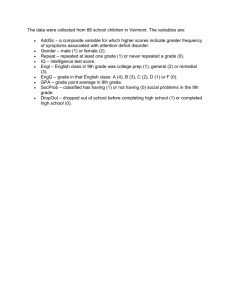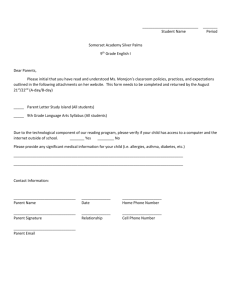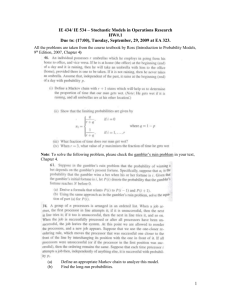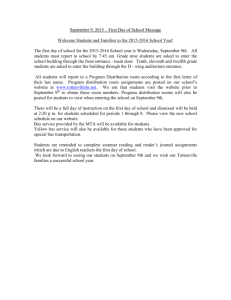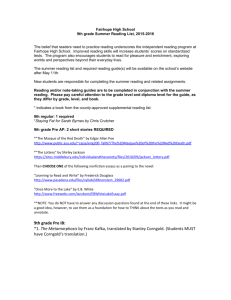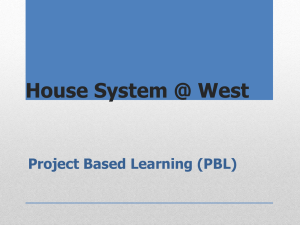lifespan human development
advertisement
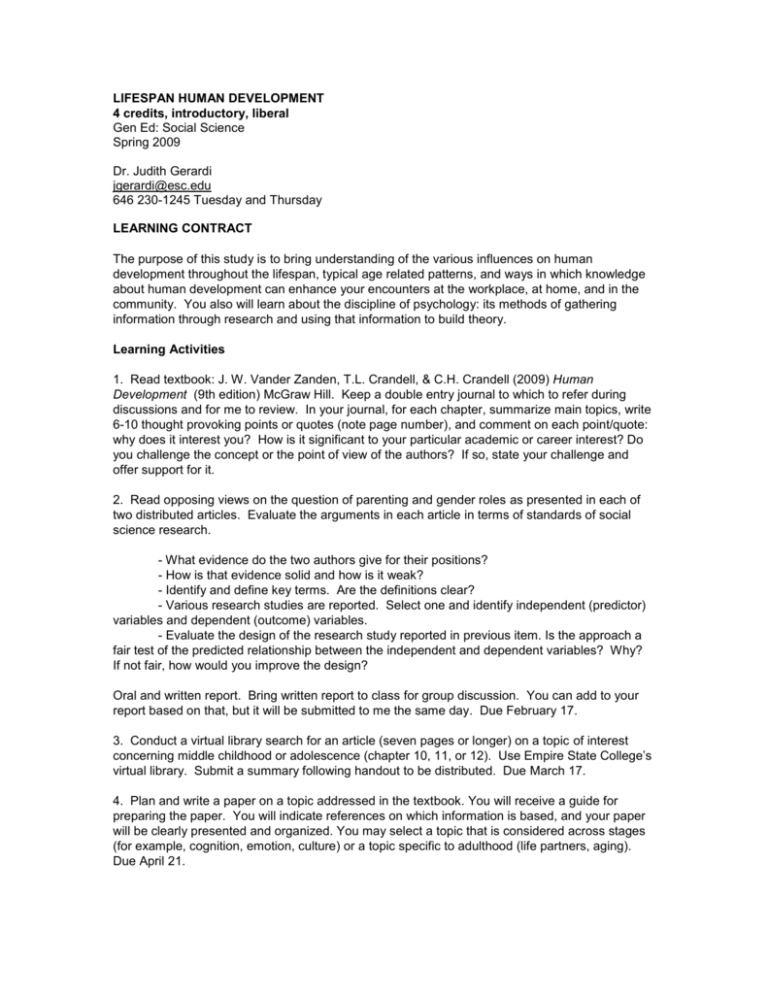
LIFESPAN HUMAN DEVELOPMENT 4 credits, introductory, liberal Gen Ed: Social Science Spring 2009 Dr. Judith Gerardi jgerardi@esc.edu 646 230-1245 Tuesday and Thursday LEARNING CONTRACT The purpose of this study is to bring understanding of the various influences on human development throughout the lifespan, typical age related patterns, and ways in which knowledge about human development can enhance your encounters at the workplace, at home, and in the community. You also will learn about the discipline of psychology: its methods of gathering information through research and using that information to build theory. Learning Activities 1. Read textbook: J. W. Vander Zanden, T.L. Crandell, & C.H. Crandell (2009) Human Development (9th edition) McGraw Hill. Keep a double entry journal to which to refer during discussions and for me to review. In your journal, for each chapter, summarize main topics, write 6-10 thought provoking points or quotes (note page number), and comment on each point/quote: why does it interest you? How is it significant to your particular academic or career interest? Do you challenge the concept or the point of view of the authors? If so, state your challenge and offer support for it. 2. Read opposing views on the question of parenting and gender roles as presented in each of two distributed articles. Evaluate the arguments in each article in terms of standards of social science research. - What evidence do the two authors give for their positions? - How is that evidence solid and how is it weak? - Identify and define key terms. Are the definitions clear? - Various research studies are reported. Select one and identify independent (predictor) variables and dependent (outcome) variables. - Evaluate the design of the research study reported in previous item. Is the approach a fair test of the predicted relationship between the independent and dependent variables? Why? If not fair, how would you improve the design? Oral and written report. Bring written report to class for group discussion. You can add to your report based on that, but it will be submitted to me the same day. Due February 17. 3. Conduct a virtual library search for an article (seven pages or longer) on a topic of interest concerning middle childhood or adolescence (chapter 10, 11, or 12). Use Empire State College’s virtual library. Submit a summary following handout to be distributed. Due March 17. 4. Plan and write a paper on a topic addressed in the textbook. You will receive a guide for preparing the paper. You will indicate references on which information is based, and your paper will be clearly presented and organized. You may select a topic that is considered across stages (for example, cognition, emotion, culture) or a topic specific to adulthood (life partners, aging). Due April 21. Evaluation Evaluation will be based on quality of completion of learning activities, awareness of stages of human development, of issues cutting across stages, and on influence of stage issues on topics selected for further study and presentation in papers. Generally, the evaluative criteria for an introductory study such as this one are level of grasp of textbook material, clarity and organization of oral and written work, and contributions to discussions. If all work is completed and is satisfactory, grade is C. If work is good, grade is B. If excellent, grade is A. Jan. 20 Jan. 27 Feb. 3 Feb. 17 Mar. 3 Mar. 17 Mar. 31 Apr. 7 Apr. 21 Introduction to each other and to lifespan developmental psychology Chapters 1-2 Ch. 5, 6 Ch. 7, 8; oral and written report evaluating research (#2 above) Ch. 9-11 Ch. 12-14; article review (#3 above) Ch. 15, 16 Ch. 17, 18 Ch. 19; topic paper due (#4 above) Read in textbook: Ch. 1, 2, 5, 6 Ch. 7 - sections on cognitive development, information processing, moral development; 7 th ed. pages 230-250 or 9th ed. pages 223-241 Ch. 8 Ch. 9 – section on cognitive development; 7th ed. 305-324 or 9th ed. 289-307 Ch. 10, 11 Ch. 12 – sections on identity, peers, family; 7th 799-409 or 9th 382-394 Ch. 13 – sections on cogn devt, moral devt; 7th 455-459 or 9th 439-445 Ch. 14 Ch. 15 – sections on cogn devt, moral devt; 7th 519-527 or 9th 508-514 Ch. 16 Ch. 17 – sections on aging, cogn, moral devt; 7th 564-572 + 581-592 or 9th 552-560 + 571-582 Ch. 18 Ch. 19 – section on healthy dying; 7th 626-636 or 9th 620-631
